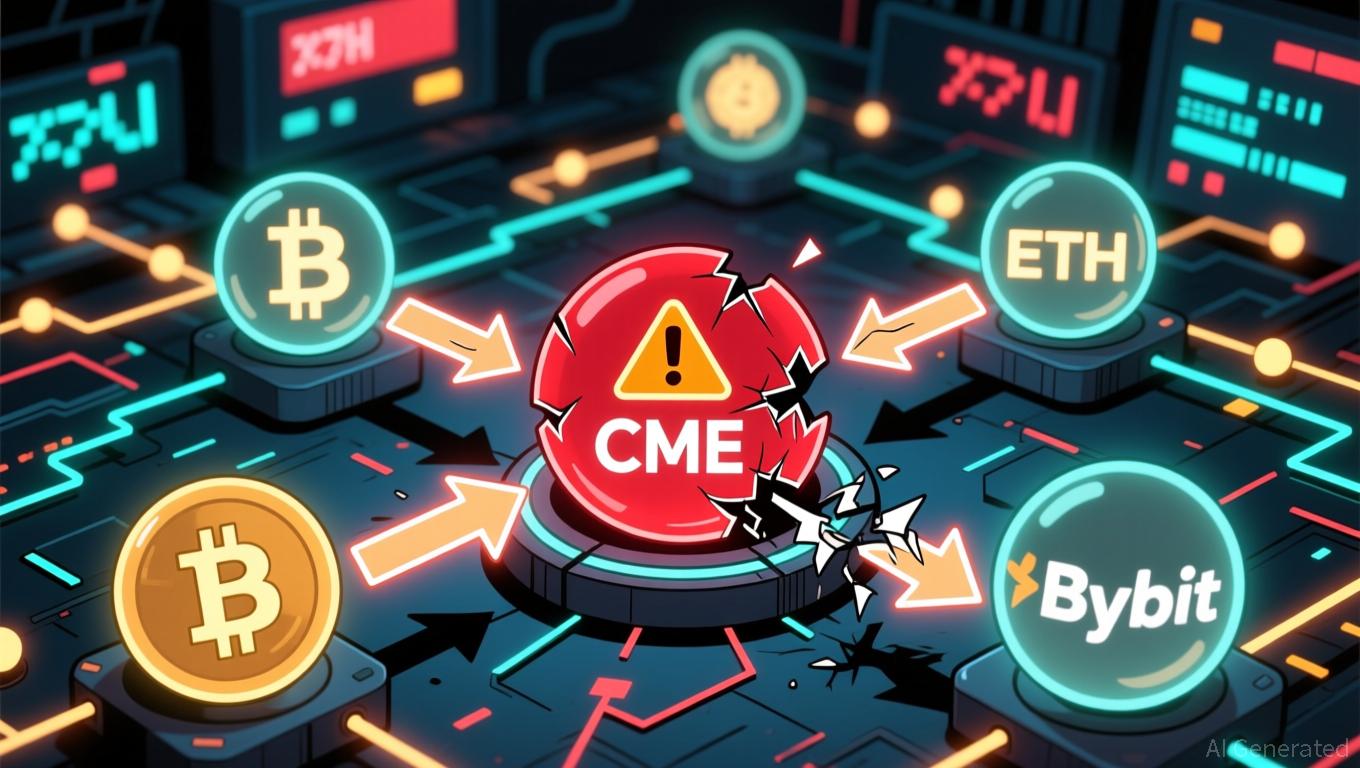Bitcoin News Update: Unveiling Layered Risks as Connections Between Crypto and Traditional Finance Deepen
- Bybit temporarily halted CME-linked crypto futures trading after CME Globex disruptions, exposing vulnerabilities in centralized infrastructure linking traditional and digital markets. - CME Group faced scrutiny for technical glitches suspending Bitcoin futures, despite record 9% monthly growth in crypto derivatives volume and 132% YoY expansion in notional value. - Analysts highlight cascading risks from centralized system failures, urging diversified risk strategies as institutional adoption of 24/7 cr
Bybit Halts CME-Linked Crypto Futures Amid Technical Disruption
Bybit has paused trading for CME-associated products, including Bitcoin and Ethereum futures, on its TradFi platform due to an interruption in CME Globex operations. This suspension, which impacts key institutional offerings such as BTC and ETH futures and options, highlights the deep connections between traditional financial markets and the digital asset sector. The incident also brings attention to the challenges centralized trading platforms face during periods of heightened volatility in crypto derivatives.
The decision from Bybit follows scrutiny of CME Group itself, which recently experienced a separate technical malfunction that led to a halt in its Bitcoin futures trading. These events reveal that even the most established financial institutions are not immune to operational vulnerabilities.

This disruption comes on the heels of a record-setting performance for CME Group, which saw 794,903 crypto futures and options contracts traded on November 21—a 9% increase over its previous record set in August. The surge in trading activity underscores growing institutional interest in regulated risk management tools as cryptocurrencies like Bitcoin experience significant price swings. So far this year, CME’s crypto derivatives volume has soared by 132% compared to 2024, with open interest climbing 82% to reach a notional value of $26.6 billion.
CME’s expansion into Solana and XRP futures, along with plans to introduce round-the-clock trading in early 2026, signals a broader institutional shift toward digital assets. The recent launch of spot-quoted futures for XRP and Solana, designed to provide real-time pricing, further cements CME’s role as a leader in crypto derivatives markets. These new offerings coincide with a notable influx into altcoin ETFs, with XRP and Solana attracting more than $300 million in combined investments in just one week.
However, the recent technical suspension of Bitcoin futures trading at CME—caused by an unspecified issue—has exposed operational risks within the sector. While CME representatives have shared limited information, the incident disrupted price discovery and liquidity, prompting traders to seek alternative platforms for market signals.
Bybit’s temporary halt of CME-linked products illustrates how disruptions in centralized systems can have ripple effects across the industry. Although the immediate impact on digital assets and decentralized finance has been contained, the event raises questions about the dependability of infrastructure that connects traditional and crypto markets. Analysts point out that similar disruptions in the past, such as CME’s 2025 product migration issues, have typically been resolved without lasting damage. Still, the situation highlights the importance of diversified risk management strategies as institutional involvement in crypto derivatives continues to grow.
Looking forward, CME Group’s plans for 24/7 crypto derivatives trading and the introduction of Bitcoin volatility indices are intended to close market gaps and improve transparency. At the same time, Bybit and other exchanges may need to broaden their product lines and strengthen their infrastructure to reduce the risks associated with single points of failure. As the boundaries between traditional and digital finance become increasingly blurred, maintaining seamless operations will be essential for sustaining market trust.
Disclaimer: The content of this article solely reflects the author's opinion and does not represent the platform in any capacity. This article is not intended to serve as a reference for making investment decisions.
You may also like
Switzerland Delays Crypto Information Exchange Pending International Coordination
- Switzerland delays crypto tax data sharing with foreign nations until 2027, citing unresolved CARF partner agreements. - The OECD's 2022 framework requires member states to exchange crypto account details, but 75 countries including the EU and UK face implementation challenges. - Transitional measures ease compliance burdens for Swiss crypto firms while awaiting finalized international data-sharing protocols. - Major economies like the U.S., China, and Saudi Arabia remain outside CARF due to non-complian

Bitcoin Updates: SGX Addresses Offshore Perp Shortfall as Bitcoin Decline Increases Demand for Hedging
- SGX launched Bitcoin and Ethereum perpetual futures, becoming a first-mover in regulated onshore crypto derivatives to meet institutional demand. - The $187B/year perp market, dominated by Asia, now gains a regulated alternative to offshore platforms with SGX's 22.5-hour trading window. - Perps enable hedging during Bitcoin's 2025 downturn, with SGX's margin-call system prioritizing investor protection over instant liquidations. - Regulatory caution limits access to accredited investors, aligning with gl

Bitcoin News Update: Institutional ETF Adjustments Challenge Key Bitcoin Support Thresholds
- Analysts warn Bitcoin faces 25% drop risk if key support levels fail amid shifting institutional ETF dynamics. - Texas's $5M IBIT purchase highlights growing government interest, but ETFs fall short of direct BTC ownership criteria. - Technical analysis shows Bitcoin trapped in a broadening wedge pattern, with breakdown below $80,000 risking $53k decline. - Institutional rebalancing sees $66M IBIT outflows vs. $171M FBTC inflows, signaling tactical ETF rotation over accumulation. - Abu Dhabi's $238M ETF

XRP News Today: IMF Cautions That Rapid Tokenized Markets Could Intensify Crashes in the Absence of Regulation
- IMF warned tokenized markets like XRP could worsen flash crashes without regulation, citing risks from decentralized systems lacking traditional safeguards. - Report acknowledged tokenization's potential to cut cross-border payment costs but highlighted volatility risks from rapid liquidity loss seen in crypto markets. - SEC's approval of crypto ETFs signals growing institutional acceptance, though regulators emphasize oversight frameworks to mitigate systemic risks. - IMF proposed a global digital marke
